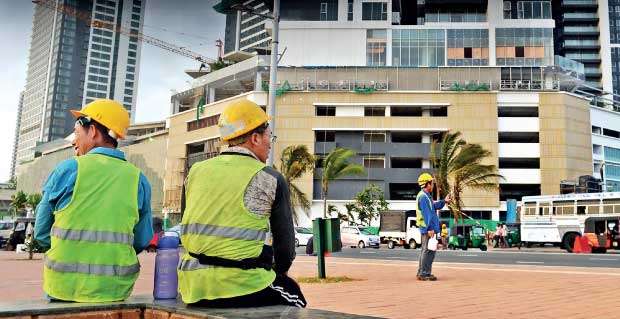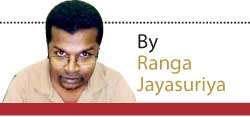This Govt. is a bad advertisement for democracy

- The latest by the Railway trade unions is a classic case of blackmail
- The problem with this Government is that it neither has determination nor decisiveness to play the role of a catalyst in developmen
 2018-08-02
2018-08-02The role of the Government as a catalyst for social and economic modernisation of the state is as old as any notion of the Government. Though the academic interest in it was reawakened in the mid 80s with the publication of ‘ Bring the State back in’, the real go-getter states existed much before. And interestingly, the majority of them were authoritarian or quasi authoritarian. The founder of modern Turkey, Kemal Ataturk, rebuilt the disintegrated Ottoman empire into a modernist secular state, even while the overwhelming majority of its rural folks remained religious and backward. Their degenerating influence on the state that he feared more than any external enemy, so the modern Turkey was built on the back of a shadow state of a secular military, judiciary and press.
 Elsewhere, developmental dictators of Taiwan and South Korea transformed their states from near nothing to future technological powerhouses. Others, such as Mahathir Mohammed and Lee Kuan Yew, though held choreographic elections, were hardly democrats.
Elsewhere, developmental dictators of Taiwan and South Korea transformed their states from near nothing to future technological powerhouses. Others, such as Mahathir Mohammed and Lee Kuan Yew, though held choreographic elections, were hardly democrats. In contrast, the track records of democracies in economic and social modernization have been abysmal. India remained a bad advertisement for democracy and colossally squandered opportunities that existed for its people during the first five decades of independence. The vast majority of developing world democracies are worse off today than their relative position vis-a-vis developed world at the time of their independence in the 1940, 50s and 60s. That they were victims of predatory elites and military juntas during some time in their independence worsened their miseries. However, subsequent elected government didn’t perform any better.
Irrespective of white vans and 18th Amendment, Mahinda Rajapaksa would be remembered as the one who won the war and built highways
Democracies’ incapacity to deliver rapid development is inbuilt in its structure. Democracy is a slow consultative process involving too many stakeholders with competing interests. Existential conditions of polarisation often make a compromise is painstakingly slow, if ever. The advocates of democracy have often overlooked the fact that for a society to develop cooperative behaviour it also has to reach a certain threshold of shared interests, which are often undermined by a plethora of competing interests and political affiliations, aggravated by low economic and social conditions of their respective societies. Developing states nonetheless have immediate economic and social priorities which can not be overlooked and in order to address them, a state needs a strong government.
After all, that is why executive the presidency was introduced in this country.
Developing world democracies
That may also explain why whenever a developing world democracy records an impressive growth that had happened under a renegotiated social contract between the government and the society, under which, a pro-growth government has staked claims for a greater control of the trajectory of the state and society. Take for instance, the two Governments that had made a significant contribution to the economy in Sri Lanka; the first few years of J. R Jayewardene Administration and the two term presidency of Mahinda Rajapaksa. Both were quasi –authoritarian and confronted the social dissent and competing vested interests through the recourse of their own constitutional and unconstitutional means, be it sacking July strikers in en messes, banning the political left or operating white vans.Similarity could be seen in India, where the pro-business prime minister Narendra Modi is more in the mould of Mahathir Mohammed, than of type of his slow- moving procrastinating predecessors of Nehru-Gandhian variety. Parallels could also be seen in Bangladesh, where Prime Minister Sheik Hasina has overseen an economic revival. They are also power maximisers in their own ways. However, their countries are not Sweden or Denmark. The developing world is poor and disorganised not just because of resource scarcity, but also because their societies are less enlightened in a modernist sense. Rather than being guided by these societies, a forward looking government should guide them. That is however untenable without the government having sufficient autonomy over the society.
The developing world is poor and disorganised not just because of resource scarcity, but also because their societies are less enlightened in a modernist sense. Rather than being guided by these societies, a forward looking government should guide them
Meagre growth
The problem with this Government is that it neither has determination nor decisiveness to play the role of a catalyst in development. Its contribution to the revival of democracy is not a supplement to its inability to forge ahead in economy. On any account, such democratic gains achieved in a low social and economic development have proved to be short lived. Four years since its election to power, and after much hype about an export led growth, export has grown only by meagre US $ 0.2 billion ( from US$ 11.1 billion in 2014 to 11.3 in 2017). FDI inflow has either stagnated or declined. Economic growth has hovered below 4 per cent for three consecutive years.And the Government’s vacillation in the economic front is aggravated by its spinelessness, which has led to wild cat strikes. The latest by the Railway trade unions is a classic case of blackmail. And the myopic demands by the Railway unions for a relocation of a technological hub , Trace Expert City, is not just a case of competing interests, but a manifestation of backwardness of certain entities. It may be to drive a point that J.R. Jayewardene sacked strikers in drove or Thatcher responded with an iron fist.
A government that shies away from difficult economic and social decisions in favour of its political calculations does more harm to the nation than one that used white vans to silence its enemies. Such countries - Pinochet’s Chile, Chiang kai Shek’s Taiwan, South Korea, etc, emerged as viable economic and democratic entities partly thanks to difficult decisions made in the past. Where as, those who pussyfooted and let the gutter impulses run the country, perpetuated the miserable status quo.The founder of modern Turkey, Kemal Ataturk, rebuilt the disintegrated Ottoman empire into a modernist secular state, even while the overwhelming majority of its rural folks remained religious and backward
Irrespective of white vans and 18th Amendment, Mahinda Rajapaksa would be remembered as the one who won the war and built highways. If this Government keeps vacillating on the economy, history would place Messrs. Ranil Wickremesinghe and Maithripala Sirisena on a long list of passengers who rode the gravy train down the precipice .
@RangaJayasuriya on Twitter
